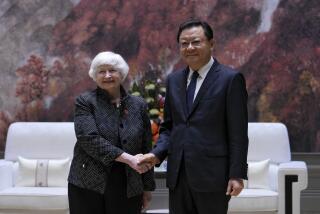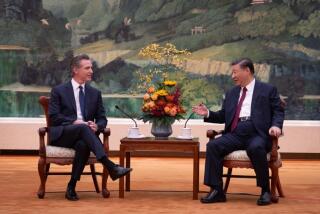Will China Continue Economic Reform Plan? Shultz Not Sure
- Share via
SHANGHAI — Secretary of State George P. Shultz, nearing the end of his five-day trip to China, said Thursday that he could not vouch for the accuracy of official Chinese assertions that the country’s economic reform program will continue despite its political turmoil.
“They (Chinese leaders) said they intend to remain on their current course of openness to the outside and reform inside, and they have said that is what makes sense because it has worked,” Shultz said. “I don’t have a crystal ball, much less a Chinese crystal ball. I can’t answer that question except to say, ‘Here is what they have said.’ ”
At an earlier press conference in Beijing, Shultz emphasized the assurances he had received from Chinese leader Deng Xiaoping and his senior aides. At that time, Shultz said, “I have no reason to question their sincerity.”
A senior State Department official said Deng told Shultz that Communist Party General Secretary Hu Yaobang was fired because he favored “total Westernization” of Chinese society. Such fundamental change would be impossible, Deng commented.
Longest Foreign Visit
Shultz, whose visit here was his longest trip to any nation since he became secretary of state, is to leave this morning for South Korea and Japan on his way home.
In addition to talking to all of China’s top leaders, Shultz devoted one full day--Wednesday--to playing tourist. He ascended to the summit of 5,000-foot Mt. Tai, a peak considered sacred during Chinese imperial times. And he visited the grave of Confucius at a separate temple devoted to the philosopher and teacher who died in the 5th Century BC.
Shultz’s visit to Shanghai, China’s largest city, was largely ceremonial. He toured a plant where McDonnell Douglas is assembling MD-82 civil aircraft under a co-production agreement with Shanghai Aviation Industrial Corp.
But the primary purpose of the stop was to give him a chance to mark the 15th anniversary of the Shanghai Communique, signed by then-President Richard M. Nixon and then-Chinese Premier Chou En-lai on Feb. 28, 1972, which has formed the basis for Sino-American relations ever since.
Repeats Taiwan Stance
Shultz renewed Washington’s commitment not to recognize Taiwan as a separate country or to pursue a “two-China” policy.
He said the United States supports the limited contacts that have developed recently between the mainland and Taiwan, the redoubt of the Nationalist Party, which was driven from power in 1949 by the Chinese Communists. The Nationalists claim to be the legitimate government of all China.
“We support a continuing evolutionary process toward a peaceful resolution of the Taiwan issue,” Shultz said. “We have welcomed the developments, including indirect trade and increasing human interchange, which have contributed to a relaxation of tensions in the Taiwan Strait. Our steadfast policy seeks to foster an environment in which such developments continue to take place.”
Beijing has called for reconciliation between Taiwan and the mainland. But the Taipei government has resisted most contacts.
More to Read
Sign up for Essential California
The most important California stories and recommendations in your inbox every morning.
You may occasionally receive promotional content from the Los Angeles Times.













